What makes you feel loved and connected to someone else? We all can probably answer that question quickly, but could we answer if we were asked to tell what makes our friend feel loved? Or our co-worker, child or husband? Listen in as Cheri and Amy discuss how to discover the delights of our peeps so that we can forge stronger relationships with them. Peek into their heart, find the answer to “What’s your personality type?” and build a bond!
(This page contains affiliate links. Your clicks and purchases help support Grit 'n' Grace at no extra charge to you.)
Recommended Resources 
- Kathi’s book: The Mom Project: 21 Days to a More Connected Family
-
Amy’s book Breaking Up with Perfect: Kiss Perfection Good-Bye and Embrace the Joy God Has in Store for You
Downloads
Your Turn!
- What is one indicator you use to measure the strength of your relationship?
- Think of one relationship you want to strengthen. How would he or she answer the question, “What’s your personality type?”
- Based on this insight, decide on one action step to create a more rewarding relationship this week.
* * * * * Cheri Okay Amy, what is something that you know you’ve done right as a mom? I don’t mean perfect, but you know for all the worries and regrets we’ve talked about, what is one thing that you feel really good about as a mom? Amy The one thing that came to mind almost immediately is that my boys know that they can talk to us about anything. Now, that has been hard won, let me say, because the way they know they can talk to us about anything is that we’ve had to have some really hard conversations. Like, uncomfortable conversations over the years to get to that point. We had to be the initiator of some of those sticky conversations and come to them with grace and love to have those conversations, but I do think that’s one of the things that we’ve done well, and I feel good about. How about you? Cheri Of all the things that we’ve done as a family, the one that turned out way, way better was our family tradition of reading together. And when the kids were little we just thought, “Oh, it’s good family time. It’s family bonding time,” And I guess I kind of assumed that as they got older we would quit doing it, but we kept on doing it well into their high school years and even when they would come home from college they would expect to read aloud for an hour in the evening in the family room. And so what developed from that was this kind of secret vocabulary, because of all the places we had gone through, books and all the characters we had known. And I would not have guessed how bonding it would be or how excited the kids would be when they would say, “Oh, I was in a conversation with so and so and they had never read such and such.” And I was like, “Oh, we read that when I was in fifth grade as a family.” I mean, like, this is something they talk about, so yeah. Amy Oh, I love that. Yeah we read together a lot too, probably not quite that long, but that is awesome. It’s nice to be able to look back, and I hope all our listeners can too, with every relationship that they have. And if we asked you, what makes this relationship great? You could say. You know, that’s a wonderful thing. Cheri Well, this is Cheri Gregory… Amy And I’m Amy Carroll… Cheri And you’re listening to Grit ‘n’ Grace: Good Girls Breaking Bad Rules, the podcast that equips you to lose who you’re not, love who you are, and live your one life well. Amy Today, we’re processing what we learned from our interview with Kathi Lipp, author of The Mom Project. Cheri Of course, as always, I just love talking to Kathi. I just love how intentional she is. And even though her book is The Mom Project, I want to talk about relationships in general, ‘cause I think a lot of what she discussed absolutely can apply to friendships and marriage, and work relationships. So how do you know if you’re connected to your kids or those that you love in general? How do you know when those connections are strong? Amy One of the things that I tend to do is take the emotional temperature of the relationship. So, I think, in healthy relationships there should be a lot of laughter, but there should be some crying, too. Because that’s an indicator of if the relationship is safe. Does everybody feel safe in it? Because I think we all have a whole range of emotions, and if we only feel safe bringing the positive to certain relationships there’s probably a little something wrong there. Cheri I love that as a litmus test. Amy One of the things I do, too, is to watch for lengthening spaces in relationships. We’ve talked a lot about friendships and relationships and sometimes relationships go away. You know, I mean they just do. But for those that we really treasure, that we know we’re called to, we just have to pay attention. That was the big thing that I got from Kathi: relationships and growing relationships doesn’t come naturally to most of us. It’s work and it takes paying attention and being intentional to keep them growing and thriving. How about you? Cheri Well, for each of my family members, I have, kind of, a different set of criteria that helps me know if were connected. For me personally, I’m naturally gonna feel more connected to someone who spends more time with me and uses lots of words with me and listens to me, because my love languages are time and words of affirmation. And so that’s the automatic, like, if I met a stranger, and they spent a long time listening to me, I would immediately feel bonded to them, so that’s kind of the danger with that. With my daughter, her love languages are more similar to mine, so when we do a lot of texting and a lot of sharing by email and then when we’re together, we just hang out. That’s how I know we’re connected. And also, I like what you said about the range of emotion. Knowing that she’ll tell me about something that she’s thrilled about and something she’s been disappointed about. Knowing that that whole range is happening. With my son, I’m more likely to know that we’re doing pretty well in terms of connection by whether he’s doing acts of service for me. But the thing that’s been hard is I have to ask him. And for the longest time, I was like, well, if he really was a loving son, he would do it automatically. And I realized, mmm, or not. <Laughter> I don’t know where that rule came from, and so, I’m getting more comfortable just being really clear about things that I would like. To say, “Hey, son, sometime this afternoon I’d like you to build a fire and in a very short period of time he’s there. And not only is he there building a fire, but he has a bellows. I don’t think we had his bellows when you were here, Amy. So it’s not just a fire. I mean he’s crafting a fire for his mother. Amy What a man! He’s such a great young man, ‘cause he crafts things in the kitchen – we love that. Now he’s crafting fires. Way to go Jonathon! Woop! Cheri My mathematician in the kitchen. And then Daniel’s love language is also acts of service and the biggest thing I have to do there is notice them, because he’ll do them, but not tell me. And so, I have to make a point to notice what he’s been doing and then realize that even though, for me, doing laundry is not an act of service. It’s not an act of love; it’s just something that has to get done. I don’t expect a thank you. I don’t expect anything. But when Daniel does it, he would like to be acknowledged that he’s done something for me, and that’s hard. Because in my head its no big deal, but for him it’s an expression of love. So I literally have to run that through a translator and say, for him, it’s an expression of love, so I need to recognize it, feel it, and see it, and then realize that’s a connection point. He doesn’t have to do it my way for it to result in connection. I need to watch for it, realize it, and listen. And say, “Oh, we’re connected. I get it, and then behave that way. Amy Well, and that was one of the things about the interview with Kathi. And what you’re saying is that love in relationships really does have to be so individualized. Now, you’re the personalities girl, so Kathi was talking about this a little bit, tell us a little bit more about the personalities. Define them a little bit for us, and then let’s talk about how we express love to people who have those personalities. Cheri Alright, well, the first one is the expressive. Some of our listeners may have heard this as the sanguine, and this personality, their number one goal in life is to have fun. And they need approval and attention. So, it’s, of course, you know, you and I both have a certain amount of this to us. So, I think it’s so easy to connect to this personality, because all you have to do is listen to them and tell them they’re wonderful. Amy This is my Nolan. We always say he is the party on wheels. He brings the fun into every room. Yes. Cheri Well, and I think another really important part of connecting to this personality is, if you need to do a reality check with them, to make sure it’s being delivered gently and in a way that doesn’t crush them. Because if an expressive person comes to you with really great news that may not be the exact moment to tell them. Yeah, well I’m glad for that but, or, yeah, you’re always starting things but never finishing them. Let them have their joy. Let them celebrate. Now, not saying lie to them, not saying you can’t also have some candor in that relationship, but probably not in that exact moment, because it feels like you’re just trying to cut them down to size. And that’s not a connecting behavior (and) that makes it less likely for them to come share with you when you’re excited. Amy Well, that pricked my heart because I can tend to do that to my youngest. And what we found out about Nolan, which was fascinating…I have been suspecting this for a while, when talking to you, but we finally did the, both of us, did the HSP test on your sensitive and strong website. So sensitiveandstrong.com, you guys, has an assessment to see where you are on the scale. As you thought about me…I’m kind of borderline. I’m kind of on the lower end of the HSP scale, but I’m in there. Nolan is very high on HSP scale. If you’re expressive and HSP, that seems like a really interesting combination. Cheri It can come across as invulnerable. But it’s not, because there’s so much positive emotional expression it can be assumed that they’re so optimistic that you really do need to pop a few balloons just to bring them back down to earth but…ooh, ooh. Amy Oh I’ve been the balloon popper. I confess. But I’m starting to get what I need to do here. So that’s really good. So how about analytics? Cheri Okay so analytic, this is going to be the personality whose goal is to not just get things perfect but to have them stay perfect. And so, kind of by definition, this is the most disappointed personality, because it’s just… You can get things perfect. You know, when I speak to a MOPS group on personalities, I say, you know, you can stay up until 2 in the morning and get the house spotless, but what happens at six a.m.? The people wake up, and they ruin everything. <Laughter> Amy Yes! Cheri And so, they need. The analytic, and some of you, have heard melancholy as an alternate term, but they desperately need order and sensitivity. They need their physical world to be in order, and they need other people to be sensitive to their personal needs. And so, if they have at one time said that they want all the shoes in the basket by the door, that goes forever and if somebody forgets or has them all over the living room floor, that’s going to be taken pretty personally as a sign of disrespect. Amy Mmm, hmm. So that’s good. It’s helpful to know these things because, hey, for most of us it’s not a big deal to put the shoes in the basket. If you know that it matters to someone you love, it makes it easier to do without chafing at it. Cheri And that kind of thing is a strong way to connect with an analytic. It’s not fun. It’s not exciting. But, you know, these two, the first two personalities, the expressive and the analytic are opposite. And so, an expressive might be like, look, I bought you balloons for your birthday! And the analytic is like I would have rather you just put your shoes in the basket, really, because that’s what is actually important to them. It’s not that they hate the balloons, but it’s like, but what I asked for is that. And you did that instead. How about you do what I ask? And that really will. That’ll be a strong connection point. It seems a little mundane, but it really does make it. And part of it is because they really feel heard. They feel heard. They asked for this, you’ve done what they asked for, and like you said…putting shoes in a basket isn’t going to destroy anybody. Its not gonna turn them into some kind of codependent. It’s just a little habit that they can shift. Amy Well, what I’m thinking, too, as you go through these, is that true relationships says what matters to you matters to me. Cheri Yeah. Amy And, um, yeah, we have to be careful with expectations on our end about that, but we can certainly reach out in those kind of ways. So how about drivers? Cheri <LAUGHTER> That’s us! Amy Yeah! Tell everybody how to please me please. Cheri This personality can be seen as a bit bossy, and the goal, the driving goal, of this personality is control. Just think of them wanting the keys to the car. They want to be in the driver’s seat. The two things this personality needs are achievement and appreciation and so their to-do list is often 3 times as long as everybody else’s. And they don’t need approval the way that the expressive does…with a driver or choleric. If you say, hey, you did such a nice job, they may well say, I know. And they’re not being egotistical; it’s just that if they’re going to bother to do it, it’s going to be done well. And this is one of those places where I think a lot of people misunderstand, because especially in a woman, this driving personality can be intimidating. We have words that I won’t say on air that describe this kind of person, unflattering words. But her goal or his goal, if it’s a guy, the goal of a driver is life transformation. They really do want to change the world. And so the appreciation they need isn’t you’re so wonderful kind of appreciation. It’s here’s how what you did made a difference for me, when you… And so you can do an amazing compliment for a driver by just really quickly letting them know how their efforts made an impact on you. That’s all they need. They don’t need accolades. They just need to know that they’re actually making a difference, because they’re working hard for that purpose. Amy Okay, I know that this is so true, because what you’re saying is s true about me. SO TRUE! And I have a double whammy because my number one strength is belief. So I’m driver and belief and so that is what I want. I want you to say what I did made a difference. And so, that’s really cool. Cheri And so that is going to be a connecting point, right? When somebody comes to you. You don’t even have to feel that they adore you, but if they say, Amy, when you did this, here’s the difference it made for me. And I’m never gonna forget it or my thinking has changed, you feel like, yes, your efforts have been worthwhile and that is a huge form of connection. Amy And then, the last group are the amiables. So how do we reach out to the amiables in our lives? Cheri Alright, the amiables goal in life is peace. They are peacemakers. This is also known as the phlegmatic personality. Often we leave them last in the list just because it’s easy to identify the expressive, ‘cause they’re busy talking. You can identify the analytic, because they’re busy organizing everything and being very detailed. And you can recognize the driver, because they’re busy telling everybody what to do. And so, it almost is a process of elimination, because they may not have any of those overt characteristics. This personality tends to be very flexible. If a situation needs a leader, they can step in and lead but then they go back to their peace-loving, relaxed persona. And if they need to be detailed and orderly they can. They can be really funny. But really, what it comes down to is conservation of energy. They generally aren’t going to put out more effort than necessary unless it’s on behalf of other people. This personality won’t work as hard for themselves, but they will kill themselves for other people. And so, the two things this person needs most are respect and self-esteem, because often this personality doesn’t get the same recognition as the others. Like, the expressive is often the cheerleader, and they’re in the popular crowd. And the analytic is often getting really, really good grades, and so that’s where they’re getting recognition. And the driver is often in the form of leadership. And the amiable is often an amazing citizen, but we don’t give citizenship awards anymore. I mean, in the classroom, this is the kid who stays after everybody else has dashed out the door and pushes in all the chairs. This is the kid who reaches under and pulls out all the gum they saw somebody stick under the table and quietly throws it in the trash. This is the person who reaches down and picks up the potato chips off the floor before somebody steps on them and grinds them into the carpet. And so, this is often a very service-oriented person and so one of the ways that we can connect with them is taking the time to get to know them. They’re not as flashy. They’re not as out there. But they’re often very artistic, very musical, or very kinesthetic and investing time is going to be a huge connecting point here. Amy Mmm. That’s good, and just taking notice. I have some people like that in my life, and because of my driver personality, I tend to underestimate them. And when I shut up for two minutes and actually let them talk, I’m like, “Oh my gosh, she’s amazing.” You know? So, yeah! Those are such, such helpful tips. Cheri So one of the things that Kathi talked about was how she and her stepson Jeremy developed this kind of secret language that was just between the two of them over comedy clips, and I really thought, wow, the importance of intentionality in allowing at least a strong part of the relationship to be based on the other person’s interest rather than just what I have in mind. Amy Well, it’s funny because I had a kind of big aha recently when I was critiquing someone else, of course. So I was watching this relationship, and I thought, she wants a relationship with him so much, but she only wants it on her terms. She wants him to come into her space. She won’t go into his space. And so I was watching and critiquing and then I had that, aha, like how many times have I done that? And I think what you are describing with the personalities, what Kathi described with Jeremy, is that if we want relationship, we have to become committed into entering someone else’s space, not expecting them to come into our space. Cheri And what I heard that Kathi and her family does is that they expand the common space. Like they aim to overlap spaces so that they have a large family space that everybody feels comfortable coming into. I thought the cheese tour…the Lipp family cheese tour that they’re planning. It just cracked me up. She actually has been posting pictures of the cheese of the month club that they’re a part of of. So do you, does the Carrolls have an equivalent of the Lipp family cheese tour? Amy Well, we have a banana cream pie thing going on, because we go to the beach every summer, at the place where I grew up going to the beach. And so, there’s just a lot of memories there, a lot of traditions there, and one of – but it’s funny, because I have a lot of traditions that I do with just my nuclear family…. my mom and dad and brother and his family. But then there are times when we go down with just the four of us, and we have created new traditions there. One of the new traditions is that we go to this restaurant that has banana cream pie to die for, and I never thought that any banana cream pie was to die for, but this one is! And so it’s just one of those silly things that we’ll talk about all year or text, like in the middle of the winter, I’m dreaming of banana cream pie, can’t wait till summer. And it’s just, you know, it’s just one of those insider jokes that we do. Not quite as elaborate as the cheese tour. We should try to set up a banana cream tour. I might gain 500 lbs. by the end but that’s, you know, a different show. Cheri I love it. I love it. Well we seem to have pie in common, because our family when we lived in southern California we developed this little tradition of whenever we would be getting a little too stressed we would just take a drive to a little town off the beaten path called Julian. And the place we stayed had no Wi-Fi; it had no TVs. It was, you know, quotes “boring.” And so we went to the little town, just consisted of a little, a good ‘ole fashioned general store, and a used bookstore that had a used bookstore cat, which was wonderful. And then it had a Julian pie company, and we stared making it a tradition to try pretty much every kind of pie they had. I think they called it a razzleberry pie that was just to die for and you know the kids. We all have really great memories around being there. And I think a part of it was being unplugged. Like, your cellphone didn’t even work when you were in Julian. This was a couple of years ago and just spending time together. Just having that time and becoming experts in something as silly as pie. I mean it doesn’t matter, but it matters. Amy Ok, pie is not silly. I can totally get behind a pie tradition. <Laughter> Cheri Okay, what is the scripture that you’re tying in with these episodes with Kathi? Amy Well, this is one that we mentioned in a recent episode. 2 Corinthians 12:9 “My grace is sufficient for you for my power is made perfect in weakness, therefore I will boast all the more gladly about my weaknesses so that Christ’s power may rest on me.” And I think that that’s relevant to this conversation, because, even with the personalities, we’re not all of them. So we’re weak in knowing how to connect with other people with different personalities, and we have to study them. We have to be intentional, and we have to work at it. And so, I think God can take our weaknesses, and, with his wisdom, we can build better relationships. Cheri So what’s the bad rule that’s come from all of this? Amy Good relationships don’t require work. I thought back to the old movie, Love Story. Love means never having to say I’m sorry. What kind of foolishness is that? Cheri GAG! Amy I think it’s probably been one of the most made-fun-of lines in movie history, right? But sometimes we do act like that. Like, if it’s a really good relationship I shouldn’t have to work so hard at it. But that’s a bad rule. Cheri So what’s the truth? Amy Creating good relationships requires thoughtful work. Cheri Oh! I love the inclusion of the word thoughtful. Amy I wanted to infuse it with the intentionality that Kathi shared with us and that you’ve shared today, too. Cheri For me, the grit aspect is that it takes work to remember that other people aren’t me. Does that sound egotistical or what? Amy No, I think we all tend towards that, yeah. Cheri And that it takes even more work to act on that knowledge. Like, I can teach the personalities and come home and be horrible to my family so just knowing the personalities is good, but acting based on it. But, for me, it’s adapting to meet their needs and that’s not changing who I am. We seem to talk about issues where there’s this fine balance a lot. I’m not gonna become a people pleaser and just lay down my personality, but to make a little accommodation and be very prayerful about when I’m going to choose something that’s a little bit more in my needs and then when I’m going to defer to someone else’s needs. And I think that’s a place where we, where another part of the grit, is really relying on the Holy Spirit to lead us there rather than our natural inclinations. Amy Absolutely. And for the grace, I think that it’s realizing that good relationships take time to develop and the grace is that we don’t expect to do one thing and have it change overnight. Kathi talked about with Jeremy that it was a long time before they found that common ground, and so, in relationships that we are called to I think we just have to give a lot of grace and say I’m in this for the long haul, and we’ll keep working on this until it’s good. Cheri Head on over to gritngracegirls.com/espiode96. Amy There you’ll find this week’s transcript, our digging deeper download, and the Bible verse art. Cheri In addition to the Grit ‘n’ Grace Podcast, Amy and I both offer one-on-one coaching. Amy is an amazing speaker coach, and I love working with writers. You can check out Amy at nextstepcoachingservices.com and me at writebesideyou.com Amy Make sure to join us next week when we’ll be talking to Arlene Pellicane, author of Calm, Cool, and Connected: 5 Digital Habits for a More Balanced Life. Cheri For today grow your grit, embrace God’s grace, and when you run across a bad rule, you know what to do. Go right on ahead and… Amy and Cheri Break it! Outtakes Amy Gasp. I just realized that I just used our scripture for this one. Shoot a monkey! Cheri What? Amy So on this Kathi one, you know, you had put two scriptures, and I just used one of them in the previous episode. Cheri It doesn’t matter. It doesn’t matter. Amy Okay. Cheri Not a problem. You can find a little segue or a little connection if you want to or not. Amy Okay. Cheri You know, I think we recovering perfectionists worry about a lot of things that nobody else worries about. I mean that’s just a theory, but it’s starting to prove true in my life. Transcript — scroll to read here (or download above)
Grit ‘n’ Grace: Good Girls Breaking Bad Rules
Episode #96:The Amazing, Happy Reward from Studying Our People
What’s YOUR personality?
You’ll never miss an episode when you sign up for weekly updates!





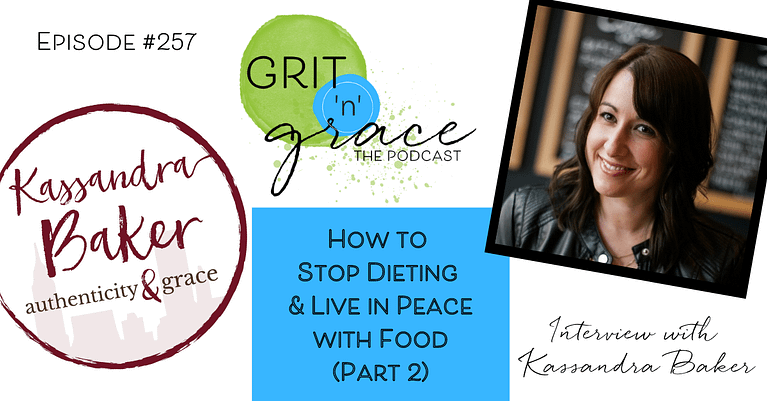
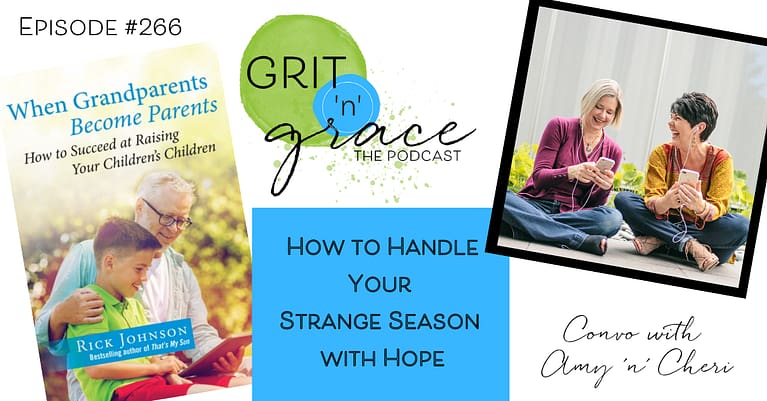
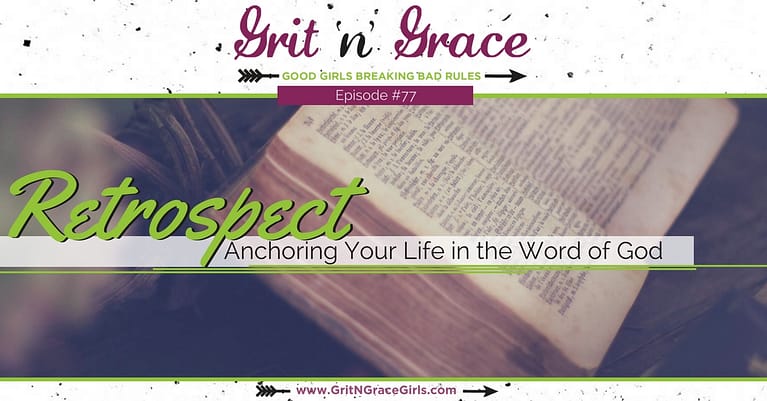
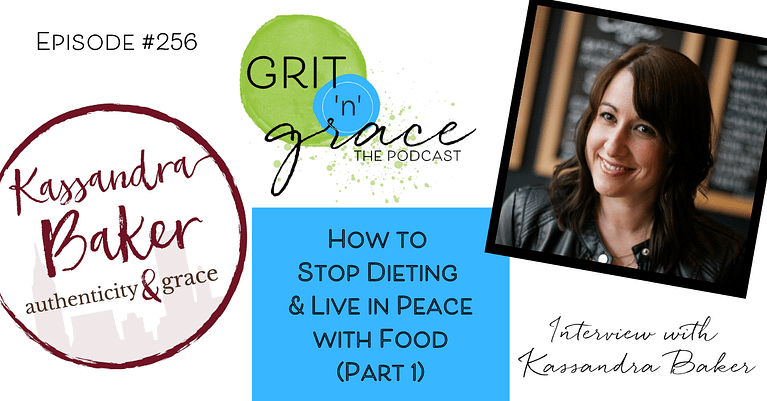
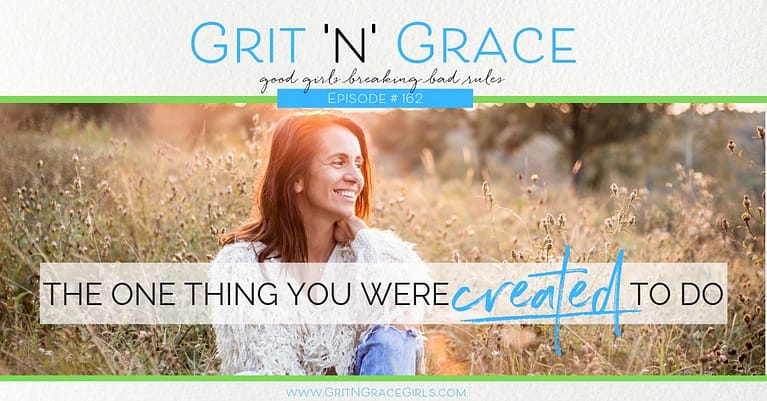
There is Joy in the Journey!! My friend and I try to walk together at least 3 days a week. This one particular summer afternoon, we started on our walk even though the skies looked ominous. 1 mile in the flood gates opened and we got drenced. Had we consulted the weather radar first, we would have seen the storm was quickly approaching. Instead of being upset, we laughed all the way home and were completely drenched by the time we reached her home.
There’s always joy in the journey!! We just have to look for it…sometimes with a magnifying glass…but it is there!! I was looking forward to retiring….but I didn’t make it…disability came first. I struggled with my worth and usefulness God and others…but then I realized…I had more time now to give to God and others!! I just had to look for the what God had been showing me but I was too upset about the change to see it. Just look…your way is there!!
Joy in the Journey!!
There is Joy in the Journey! My daughter had been told she could never have children. When she got married in 2016, it was with the understanding that she would never be a mother, even though she wanted it so much. In April 2017 she found out they were pregnant. A couple of months later she was told she had cervical cancer. In November, just before her 40th birthday, God blessed us with a healthy, beautiful little girl. In December, my daughter was declared cancer free! Miracle after miracle.